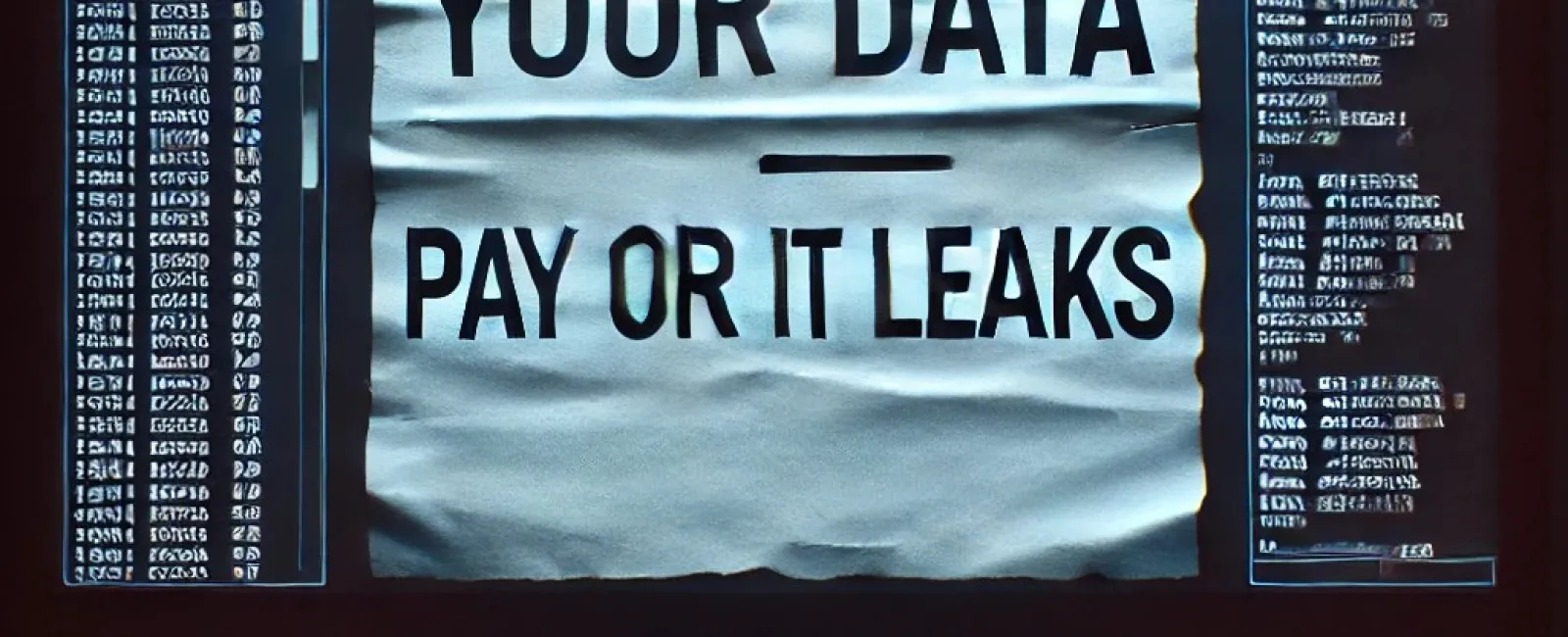April 21, 2025
Think ransomware is your worst nightmare? Think again.
Hackers have discovered a new method to hold businesses hostage, and it might be even more ruthless than traditional encryption. This new approach is known as data extortion, and it is reshaping the landscape of cyber threats.
Here's how it operates: Instead of encrypting your files, hackers simply steal your sensitive data and threaten to leak it unless you pay a ransom. There are no decryption keys or file restoration involved—just the overwhelming fear of having your private information exposed on the dark web and the reality of a public data breach.
This tactic is rapidly gaining traction. In 2024, over 5,400 extortion-based attacks were reported globally, marking an 11% increase from the previous year. (Cyberint)
This is not just an evolution of ransomware; it represents an entirely new type of digital hostage situation.
The Rise Of Data Extortion: No Encryption Necessary
The era of ransomware locking you out of your files is over. Now, hackers are skipping encryption entirely. Why? Because data extortion is quicker, simpler, and more lucrative.
Here's how it unfolds:
- Data Theft: Hackers infiltrate your network and discreetly steal sensitive information such as client data, employee records, financial documents, and intellectual property.
- Extortion Threats: Rather than encrypting your files, they threaten to release the stolen data publicly unless you comply with their demands.
- No Decryption Needed: Since they aren't encrypting files, they don't need to provide decryption keys, allowing them to evade traditional ransomware defenses.
And they are succeeding.
Why Data Extortion Is More Dangerous Than Encryption
When ransomware first emerged, businesses primarily worried about operational disruptions. However, with data extortion, the risks are significantly elevated.
1. Reputational Damage And Loss Of Trust
If hackers leak client or employee data, the impact goes beyond information loss; it jeopardizes trust. Your reputation can be irreparably harmed, and regaining that trust could take years, if it is even possible.
2. Regulatory Nightmares
Data breaches often lead to compliance violations, resulting in GDPR fines, HIPAA penalties, or PCI DSS infractions. When sensitive data is exposed, regulators are quick to impose substantial fines.
3. Legal Fallout
Leaked data can trigger lawsuits from clients, employees, or partners whose information was compromised. Legal fees can be devastating for small and midsize businesses.
4. Endless Extortion Cycles
Unlike traditional ransomware, where paying the ransom leads to file recovery, data extortion lacks a definitive endpoint. Hackers can retain copies of your data and continue to extort you months or even years later.
Why Are Hackers Ditching Encryption?
Simply put, it's easier and more profitable.
While ransomware attacks are still increasing—with 5,414 incidents reported worldwide in 2024, an 11% rise from the prior year (Cyberint)—extortion offers:
- Faster Attacks: Encrypting data is time-consuming and resource-intensive. In contrast, stealing data is quick, especially with modern tools that enable hackers to extract information discreetly.
- Harder To Detect: Traditional ransomware often triggers antivirus and endpoint detection systems. Data theft can be concealed as regular network traffic, making it more challenging to identify.
- More Pressure On Victims: The threat of leaking sensitive data creates a personal and emotional impact, heightening the likelihood of payment. No one wants their clients' personal details or proprietary business information exposed on the dark web.
No, Traditional Defenses Aren't Enough
Conventional ransomware defenses do not adequately protect against data extortion. Why? Because they are designed to prevent data encryption, not data theft.
If you rely solely on firewalls, antivirus software, or basic endpoint protection, you are already at a disadvantage. Hackers are now:
- Using infostealers to collect login credentials, facilitating easier access to your systems.
- Exploiting vulnerabilities in cloud storage to access and extract sensitive files.
- Disguising data exfiltration as normal network activity, circumventing traditional detection methods.
The use of AI is also making these attacks faster and more efficient.
How To Protect Your Business From Data Extortion
It's time to reevaluate your cybersecurity strategy. Here's how to stay ahead of this escalating threat:
1. Zero Trust Security Model
Assume every device and user poses a potential threat. Verify everything without exception.
- Implement rigorous identity and access management (IAM).
- Use multifactor authentication (MFA) for all user accounts.
- Continuously monitor and validate devices connecting to your network.
2. Advanced Threat Detection And Data Leak Prevention (DLP)
Basic antivirus solutions are insufficient. You need advanced, AI-driven monitoring tools that can:
- Detect unusual data transfers and unauthorized access attempts.
- Identify and block data exfiltration in real-time.
- Monitor cloud environments for suspicious activities.
3. Encrypt Sensitive Data At Rest And In Transit
If your data is stolen but encrypted, it becomes useless to hackers.
- Utilize end-to-end encryption for all sensitive files.
- Implement secure communication protocols for data transfers.
4. Regular Backups And Disaster Recovery Planning
While backups won't prevent data theft, they will ensure you can quickly restore your systems in the event of an attack.
- Use offline backups to guard against ransomware and data destruction.
- Regularly test your backups to ensure they function when needed.
5. Security Awareness Training For Employees
Your employees are your first line of defense. Train them to:
- Recognize phishing attempts and social engineering tactics.
- Report suspicious emails and unauthorized requests.
- Adhere to strict access and data-sharing protocols.
Are You Prepared For The Next Generation Of Cyberattacks?
Data extortion is here to stay and is becoming increasingly sophisticated. Hackers have developed new ways to coerce businesses into paying ransoms, and traditional defenses are no longer sufficient.
Don't wait until your data is at risk.
Start with a FREE
Initial Consultation. Our cybersecurity experts will evaluate your current
defenses, identify vulnerabilities and implement proactive measures to protect
your sensitive information from data extortion.
Click here or give us a call at 312-564-5446 to schedule your FREE Initial Consultation today!
Cyberthreats are evolving. Isn't it time
your cybersecurity strategy evolved too?




